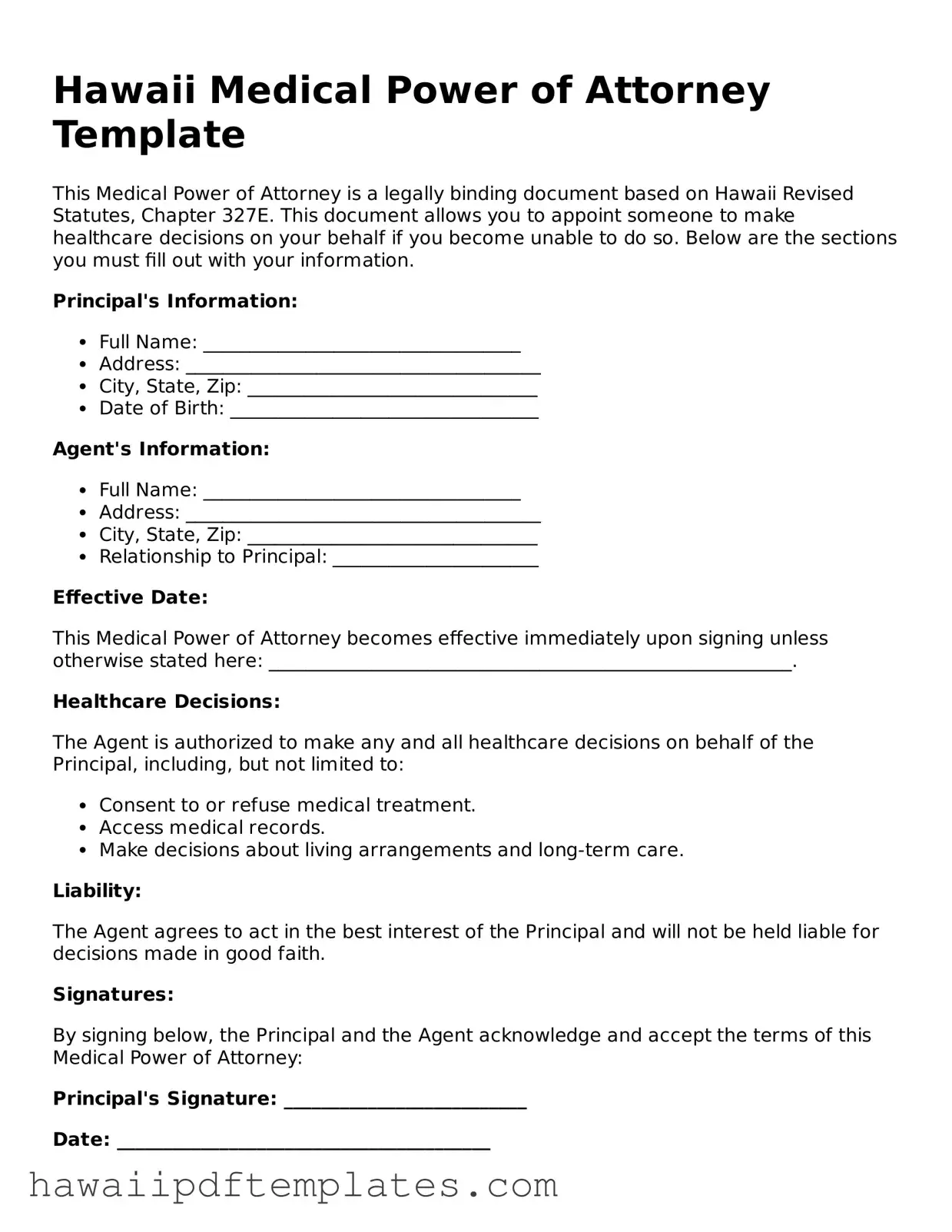Free Medical Power of Attorney Document for Hawaii State
Frequently Asked Questions
-
What is a Hawaii Medical Power of Attorney?
A Hawaii Medical Power of Attorney is a legal document that allows an individual, known as the principal, to designate another person, referred to as the agent, to make healthcare decisions on their behalf in the event they become incapacitated. This document ensures that the principal's healthcare preferences are respected even when they cannot communicate them directly.
-
Who can serve as an agent under a Medical Power of Attorney in Hawaii?
In Hawaii, any competent adult can be appointed as an agent. This includes family members, friends, or trusted individuals. However, it is important to choose someone who understands your healthcare wishes and is willing to advocate for you. Certain individuals, such as healthcare providers or employees of healthcare facilities, may have restrictions on serving as agents to avoid conflicts of interest.
-
How do I create a Medical Power of Attorney in Hawaii?
To create a Medical Power of Attorney in Hawaii, you need to complete the appropriate form, which can be obtained from various legal resources or healthcare organizations. The form must be signed by the principal and witnessed by two individuals or notarized. It's crucial to ensure that the document complies with Hawaii's legal requirements to be valid.
-
Can I revoke my Medical Power of Attorney?
Yes, you can revoke your Medical Power of Attorney at any time as long as you are competent to do so. To revoke, you should create a written statement indicating your intent to revoke the document and notify your agent and any relevant healthcare providers. It is advisable to also destroy any copies of the original document to prevent confusion.
-
What happens if I do not have a Medical Power of Attorney?
If you do not have a Medical Power of Attorney and become incapacitated, healthcare decisions may be made by family members or legal guardians according to Hawaii's laws. This process can lead to disagreements among family members or may not reflect your personal wishes. Having a Medical Power of Attorney ensures that your preferences are clearly outlined and followed.
Other Common Hawaii Forms
Is Hawaii a 50/50 Divorce State - This document provides structure during an emotional time of change.
When completing a vehicle transaction in Florida, it's crucial to use the appropriate documentation, such as the Florida Motor Vehicle Bill of Sale, which details the sale and protects both the buyer and seller. For additional resources and forms, you can visit Florida Forms, ensuring you have everything needed for a smooth ownership transfer.
Hawaii Residential Lease Agreement - Includes information on property rules regarding noise and disturbances.
Steps to Writing Hawaii Medical Power of Attorney
After gathering the necessary information, you’re ready to complete the Hawaii Medical Power of Attorney form. This document allows you to designate someone to make healthcare decisions on your behalf if you become unable to do so. Follow the steps below to ensure that the form is filled out correctly.
- Begin by downloading the Hawaii Medical Power of Attorney form from a reliable source or obtaining a physical copy.
- Carefully read through the entire form to understand the sections you will be filling out.
- In the first section, provide your full name and address. This identifies you as the person granting the power of attorney.
- Next, designate your chosen agent by writing their full name and contact information. This is the person who will make medical decisions for you.
- Consider adding an alternate agent. If your primary agent is unable or unwilling to act, this person can step in.
- In the subsequent section, specify any limitations or specific instructions regarding the medical decisions your agent can make. Be clear and concise.
- Sign and date the form in the designated area. Your signature confirms your intent and agreement to the document.
- Have the form witnessed by at least two individuals who are not related to you and who do not stand to benefit from your estate. They will sign the form to confirm they witnessed your signature.
- Finally, consider having the form notarized for added validity, although this may not be required.
Misconceptions
Understanding the Hawaii Medical Power of Attorney form is crucial for ensuring that your healthcare preferences are honored. However, several misconceptions can lead to confusion. Here are four common misunderstandings:
- Misconception 1: A Medical Power of Attorney is the same as a Living Will.
- Misconception 2: You can only have one Medical Power of Attorney at a time.
- Misconception 3: Once the form is signed, it cannot be changed.
- Misconception 4: A Medical Power of Attorney is only necessary for older adults.
This is not accurate. While both documents relate to healthcare decisions, a Medical Power of Attorney allows someone to make decisions on your behalf if you are unable to do so. A Living Will, on the other hand, outlines your wishes regarding specific medical treatments.
This is a common belief, but it is possible to designate multiple individuals as agents. However, it’s important to clearly outline their roles and responsibilities to avoid any confusion during critical times.
This is not true. You have the right to revoke or modify your Medical Power of Attorney at any time, as long as you are of sound mind. It’s important to communicate any changes to your healthcare provider and your designated agents.
This misconception overlooks the fact that anyone, regardless of age, can face unexpected medical situations. Having a Medical Power of Attorney ensures that your healthcare choices are respected, no matter your age.
